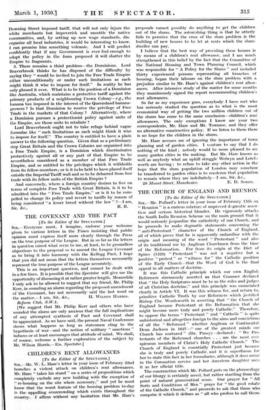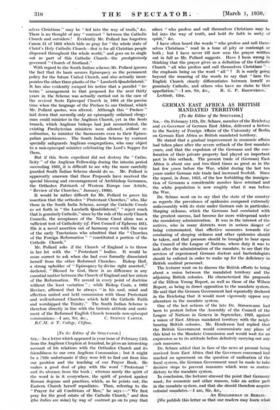THE CHURCH OF ENGLAND AND REUNION [To the Editor of
the SPECTATOR.] Sin,—Mr. Pollard's letter iri your issue of February 15th. on " Reunion " is a curious mixture of unproved dogmatic asser- tion and serious historical blunder. He vigorously attacks the South India Reunion Scheme on the main ground that it would seriously jeopardize the catholicity of our Church, and he proceeds to make dogmatic statements concerning the " anti-Protestant " character of the Church of England, all of which prove that he is apparently unfamiliar with the origin and meaning of the word " Protestant " and also of its traditional use by Anglican Churchmen from the time of the Reformation. For from its origin at the Diet of Spires (1529) " Protestant " was not a negative but a positive " protest " or "witness for" the Catholic position of the Early Church—that the Word of God is the final appeal in all matters of doctrine.
It was this Catholic principle which our own English Reformers strenuously asserted so that Cranmer declared that " the Holy Scriptures must be to us the rules and judges of all Christian doctrine," and this principle was enunciated clearly in Article VI. It was this witness for, and return to, primitive Catholic Truth by our Reformers which justified Bishop Chr. Wordsworth in asserting that " the Church of England became Protestant at the Reformation that she might become more truly and purely Catholic." Therefore, to oppose the terms " Protestant " and " Catholic " is quite unhistorical and altogether foreign to the aims and convictions of all the " Reformed " whether Anglican or Continental. Dean Jackson in 1627—" one of the greatest minds our Church has nurtured " (Dr. Pusey)—declared : " We Pro- testants of the Reformed churches . . . are the most con- spicuous members of Christ's Holy Catholic Church." The Church of England is essentially Protestant just because she is truly and purely Catholic, and it is superfluous for her to state this fact in her formularies, although it does occur in the Coronation service and her American daughter uses it as her official title.
The construction which Mr. Pollard puts on the phraseology of our liturgy is certainly novel, but rather startling from the point of natural graminatical sense. Our prayer for " All Sorts and Conditions of Men " prays for " the gOod estate of the Catholic Church," :and proceeds to ask that those who comprise it which it defines as " all who profess to call them-
selves Christians " may be " led into the way of truth," &c. There is no thought of any " contrast " between the Catholic Church and outsiders ! Evidently Mr. Pollard has forgotten Canon 51 of 1603 which bids us pray for " the whole state of Christ's Holy Catholic Church—that is for all Christian people dispersed throughout the whole world," and goes on to single out as part of this Catholic Church—the presbyterianly governed " Church of Scotland."
With regard to the South Indian scheme; Mr. Pollard ignores the fact that its basis secures Episcopacy as the permanent policy for the future United Church, and also actually incor- porates the other three planks of the " Lambeth Quadrilateral." It has also evidently escaped his notice that a parallel " in- terim " arrangement to that proposed for the next thirty years in the Scheme was actually carried out in the case of the revived Scots Episcopal Church in 1661 at the precise time when the language of the Preface to our Ordinal, which Mr. Pollard quotes, was altered. Although this " Preface laid down that normally only an episcopally ordained clergy- man could minister in the Anglican Church, yet in the Scots branch, which Anglican bishops had just reconstituted, the existing Presbyterian ministers were allowed, without re- ordination, to minister the Sacraments even to their Episco- palian parishioners. The South Indian Scheme by contrast specially safeguards Anglican congregations, who may object to a non-episcopal minister celebrating the Lord's Supper for them.
But if this Scots expedient did not destroy the " Catho- licity " of the Anglican Fellowship during the interim period succeeding 1662 it is difficult to see why the more carefully guarded South Indian Scheme should do so. Mr. Pollard is apparently unaware that these Proposals have received the special blessing and encouragement of Archbishop Germans, the Orthodox Patriarch of Western Europe (see Article, " Review of the Churches," January, 1930).
It would be rather difficult for Mr. Pollard to prove his assertion that the orthodox " Protestant Churches," who, like those in the South India Scheme, accept the Catholic Creeds as set forth in " the Lambeth Quadrilateral," " reject much. that is genuinely Catholic," since by the rule of the early Church Councils, the acceptance of the Nicene Creed alone was a sufficient test of Catholicity (cf. First Council of Ephesus 431). His is a novel assertion out of harmony even with the view of the early Tractarians who admitted that the " Churches, of the Foreign Reformation " "constituted a portion of the- Catholic Church."
Mr. Pollard asks if the Church of England is to throw in her lot with the Protestant " bodies: It would be more correct to ask when she had ever formally dissociated herself from the other Reformed Churches. Bishop Hall, a strong upholder of " Episcopacy by divine right asserted," declared, " Blessed be God, there is no difference in any essential matter between the Church of England and her sisters Of the Reformation. We accord in every point of doctrine without the least variation " ; while Bishop Cosin, a 1662 Reviser, affirmed that he always " in his soul, mind and affection united and held communion with those Protestant and well-reformed Churches which held the Catholic Faith and worshipped the Trinity." The South Indian Scheme is therefore directly in line with the historic attitude and senti- ment of the Reformed English Church towards non-episcopal
communions.—I am, Sir, &e., C. SYDNEY CARTER. B.C.M. & T. College, Clifton.

























































 Previous page
Previous page